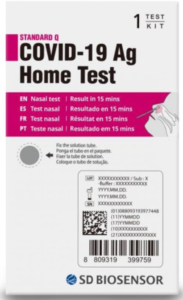3.6.22
By Mike Smith
 On March 1, 2022, the US Food and Drug Administration issued a Class 1 recall of the SD Biosensor Inc. STANDARD Q COVID-19 Ag Home Test because: “The test is not authorized, cleared, or approved by the FDA for distribution or use in the United States. The FDA is concerned about the risk of false results when using this unauthorized test.”
On March 1, 2022, the US Food and Drug Administration issued a Class 1 recall of the SD Biosensor Inc. STANDARD Q COVID-19 Ag Home Test because: “The test is not authorized, cleared, or approved by the FDA for distribution or use in the United States. The FDA is concerned about the risk of false results when using this unauthorized test.”
The FDA Class 1 recall notification states that the unauthorized SD Biosensor STANDARD Q COVID-19 Ag Home Test uses a nasal swab sample to detect proteins, called antigens, from SARS-CoV-2, the virus that causes COVID-19.
The recalled product should not be confused with SD Biosensor’s approved at-home test, the SD Biosensor COVID-19 At-Home Test, authorized by the FDA on December 24, 2021, which is a different test and is not the subject of this Safety Communication. The authorized test is distributed by Roche and can continue to be used.
According to the FDA, there have been no reports of injuries, adverse health consequences, or death associated with use of the SD Biosensor STANDARD Q COVID-19 Ag Home Test.
